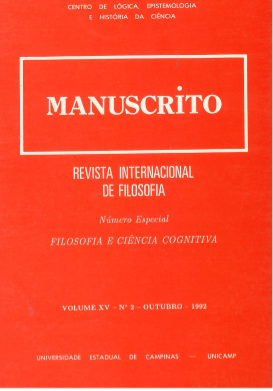Resumo
O artigo trata do problema filosófico das relações mente-corpo e discute as possíveis contribuições da Inteligência Artificial e do modelo computacional da mente para a solução deste problema. A primeira parte retraça as raízes históricas da distinção entre o físico e o mental remetendo-nos aos trabalhos de R. Descartes. A segunda parte aborda algumas teorias contemporâneas tais como a análise linguística proposta por G. Ryle, as teorias da identidade mente-cérebro e o materialismo eliminativo. A terceira parte analisa o trabalho de H. Putman e sua analogia entre mentes e máquinas. Finalmente, na última parte, abordamos novas metáforas computacionais baseadas em modelos conexionistas e discutimos em que sentido estas podem contribuir para esclarecer as dificuldades conceituais envolvidas no problema das relações mente-cérebro.
Referências
Alanen, L. (1981). Descartes’ Dualism and the Philosophy of Mind Revue de Métaphysique et de Morale, 3: 391-413.
Dennett, D. (1969). Content and Consciousness. London: Routledge & Kegan Paul.
Descartes, R. (1641). Abregé des Méditations. Ed. F. Paris, Garmier, 1967, T.I.
Descartes, R. (1641). Méditations. Ed. F. Paris, Garnier, 1967, T.I.
Descartes, R. (1637). Discours de la Méthode. Ed. F. Paris, Garnier, 1967, T.I.
Descartes, R. (1644). Principes de la Philosophie. Ed. F. Paris, Garnier, 1967, T. III.
Feigl, H. (1958). The “Mental” and the “Physical”, in H. Feigl, M. Scriven, & G. Maxwell (eds.). Minnesota Studies in the Philosophy of Science, vol. 2. Minneapolis: University of Minnesota Press.
Gleick, J. (1987). Chaos: Making a New Science. Tradução de W. Dutra, (1990), Rio de Janeiro Editora Campus.
Hinton, G & Anderson, J. (1981). Parallel Models of Associative Memory. Hillsdale, NJ. Lawrence Erlbaum.
McCulloch, W. & Pitts, W. (1943). A Logical Calculus of the ideias immanent in nervous activity Bulletin of Mathematical Biophysics, 5: 115-133.
Nagel, T. (1965). Physicalism. In The Philosophical Review, 74, 3: 339-356.
Peacocke, C. (1983). Sense and Content. Oxford: Clarendon Press.
Place, U.T. (1970). Is Consciousness a Brain Process? in The Mind/Brain Identity Theory, ed. por C.V. Borst. London: The Macmilllan Press: 42-51.
Perry, J. (1972). Can the Self Divide? Journal of Philosophy, 59, 16: 463-489.
Putnam, H. (1975). Minds and Machines in Ptunam, H. Mind, Language and Reality. Cambridge: Cambridge University Press. 362-385.
Quine. W.V. (1969). Epistemology Naturalized in Quine, W.V. (ed), Ontological Relativity and Other Essays. New York: Columbia University Press: 69-90.
Rorty, R. (1979). Philosophy and the Mirror of Natture. Princeton, NJ: Princeton University Press.
Rumelhart, D. & McCleland, J. (s.d.). Parallel Distributed Processing: Foundations. Cambridge, Ma: MIT Press/Bradford Books.
Russel, B. (1971). The Analysis of Mind. London: George Allen & Unwin.
Ryle, G. (1949). The Concept of Mind. New York: Barnes & Noble.
Smart, J.J.C. (1989). Our Place in the Universe. Oxford: Basil Blackwell.
Smart, J.J.C. (1962). Sensations and Brain Processes in The Mind/Brain Identity Theory ed. C.V. Borst London: The Macmillan Press. 52-66.
Teixeira, J. de F. (1990). O que é Inteligência Artificial. S. Paulo: Editora Brasiliense.
Teixeira, J. de F. (1990). Ensaio sobre a Moral de Descartes. S. Paulo: Editora Brasiliense.

Este trabalho está licenciado sob uma licença Creative Commons Attribution 4.0 International License.
Copyright (c) 1992 Manuscrito: Revista Internacional de Filosofia


